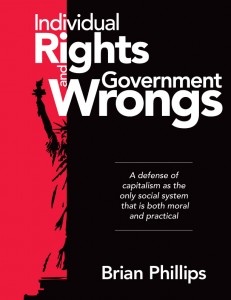What does happiness mean to you? Does it mean a career that you love? Does it mean a family? Does it mean discovering a cure for some horrible disease? Does it mean building your dream house? No matter your answer, only you can determine what will bring you satisfaction, joy, and happiness. Only you can determine what values make your life worth living.
The right to the pursuit of happiness means just that. You have a moral right to take the actions you deem necessary to achieve the values that will bring you happiness. The right to the pursuit of happiness is not a guarantee that you will achieve the values that you desire, but the freedom to pursue your values as you judge best. Just as the right to property does not mean that others must provide you with a home, an automobile, a flat-screen television, or any other material value, so the right to the pursuit of happiness does not mean that others must ensure your satisfaction and joy.
The Founding Fathers regarded the right to the pursuit of happiness to be as important as the rights to life and liberty; indeed, these rights are inseparable. To live your life as you choose, you must have the liberty to pursue the values that bring you happiness. You must be free to choose both the ends—your values—and the means—the actions you will take to achieve those values.
As we have seen, government force can stop you from pursuing your values. Through regulations, controls, prohibitions, and mandates, government can compel you to act contrary to your judgment. Government can force you to abandon your values; it can erect outrageous obstacles in your path. Occupational licensing laws can force you to abandon a career unless you meet arbitrary standards. The Food and Drug Administration can prohibit you from selling (or taking) medications that it has not approved. Land-use regulations can prevent you from building your dream house. Government—the agency that is supposed to protect your right to the pursuit of happiness—can, and often does, stop you from doing just that.
Government intervention is founded on the premise that you have a moral obligation to serve others. According to altruism, you have a duty to place the welfare and interests of others before your own. In other words, you must sacrifice your values and your happiness for the values and happiness of others. If you cannot live as you choose, if you are not free to act on your own judgment, if your property may be seized for the use of others, you are not free to pursue your own happiness.
By now, the impracticality of government intervention should be clear. Government intervention violates your right to life, liberty, property, and the pursuit of happiness. It should also be clear that private, non-coercive alternatives exist. But does this mean that allgovernment intervention is evil? Does it mean that individuals should be free to do anything they desire? Wouldn’t a capitalist society turn into “dog-eat-dog” competition and “survival of the fittest”? Is a capitalist society even possible? These are the questions we will now answer.
Click here to see the Table of Contents.
Click here to read the Introduction.
Click here to read the Introduction to Part 1.
Click here to read the Introduction to Part 2.
Click here to read the Introduction to Part 3.
Click here to read the Introduction to Part 4.
Individual Rights and Government Wrongs in paperback
Individual Rights and Government Wrongs
Individual Rights and Government Wrongs for ePub (Nook and iBooks)
Get the free ePub Reader here
Individual Rights and Government Wrongs in PDF
I am available for interviews, guest blogging, and speaking engagements. Click here to contact me.

